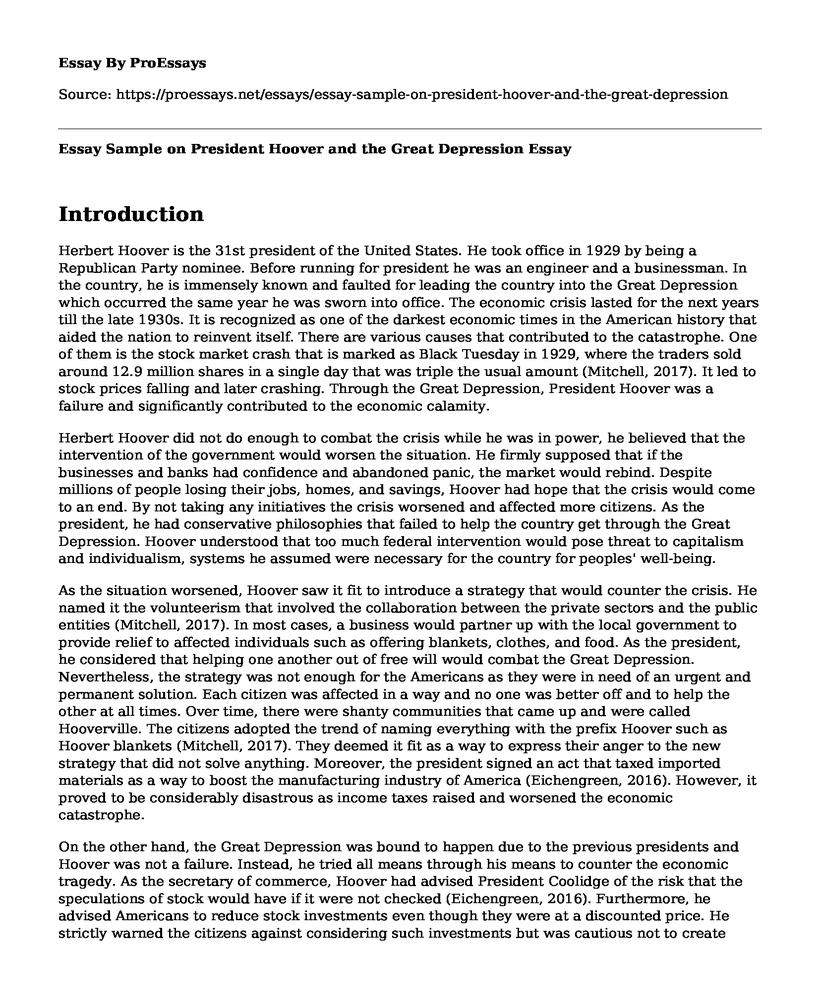Introduction
Herbert Hoover is the 31st president of the United States. He took office in 1929 by being a Republican Party nominee. Before running for president he was an engineer and a businessman. In the country, he is immensely known and faulted for leading the country into the Great Depression which occurred the same year he was sworn into office. The economic crisis lasted for the next years till the late 1930s. It is recognized as one of the darkest economic times in the American history that aided the nation to reinvent itself. There are various causes that contributed to the catastrophe. One of them is the stock market crash that is marked as Black Tuesday in 1929, where the traders sold around 12.9 million shares in a single day that was triple the usual amount (Mitchell, 2017). It led to stock prices falling and later crashing. Through the Great Depression, President Hoover was a failure and significantly contributed to the economic calamity.
Herbert Hoover did not do enough to combat the crisis while he was in power, he believed that the intervention of the government would worsen the situation. He firmly supposed that if the businesses and banks had confidence and abandoned panic, the market would rebind. Despite millions of people losing their jobs, homes, and savings, Hoover had hope that the crisis would come to an end. By not taking any initiatives the crisis worsened and affected more citizens. As the president, he had conservative philosophies that failed to help the country get through the Great Depression. Hoover understood that too much federal intervention would pose threat to capitalism and individualism, systems he assumed were necessary for the country for peoples' well-being.
As the situation worsened, Hoover saw it fit to introduce a strategy that would counter the crisis. He named it the volunteerism that involved the collaboration between the private sectors and the public entities (Mitchell, 2017). In most cases, a business would partner up with the local government to provide relief to affected individuals such as offering blankets, clothes, and food. As the president, he considered that helping one another out of free will would combat the Great Depression. Nevertheless, the strategy was not enough for the Americans as they were in need of an urgent and permanent solution. Each citizen was affected in a way and no one was better off and to help the other at all times. Over time, there were shanty communities that came up and were called Hooverville. The citizens adopted the trend of naming everything with the prefix Hoover such as Hoover blankets (Mitchell, 2017). They deemed it fit as a way to express their anger to the new strategy that did not solve anything. Moreover, the president signed an act that taxed imported materials as a way to boost the manufacturing industry of America (Eichengreen, 2016). However, it proved to be considerably disastrous as income taxes raised and worsened the economic catastrophe.
On the other hand, the Great Depression was bound to happen due to the previous presidents and Hoover was not a failure. Instead, he tried all means through his means to counter the economic tragedy. As the secretary of commerce, Hoover had advised President Coolidge of the risk that the speculations of stock would have if it were not checked (Eichengreen, 2016). Furthermore, he advised Americans to reduce stock investments even though they were at a discounted price. He strictly warned the citizens against considering such investments but was cautious not to create panic. Moreover, the government did not bother to impose regulations on the stock market. During his reign, Hoover encouraged the citizens to work harder and for business entities to retain their workers so that production may continue. Additionally, he did all in his effort such as pushing for the implementation of 160 million dollars tax cut which would aid in support of the income of each American (Eichengreen, 2016). Also, as a personal gesture, he rejected his salary and donated it to organizations that provided reliefs.
Conclusion
In conclusion, the Great Depression severely affected America and led to numerous people suffering. At the time it occurred, president Hoover was in office and he is constantly seen as the reason to why the situation progressed more. He did not bother to implement federal intervention as a way to maintain his beliefs on capitalism and individualism. Furthermore, he assumed that one's hard work would contribute to getting the country out of the economic tragedy. Additionally, he adopted volunteerism that was aimed at people and businesses contributing to those in need. The approach was slow, thus ineffective at the current time, leading to the advancement of the Great Depression. Moreover, interfering with the taxation system led to detrimental consequences that led no coming back to the situation, unless with the implementation of other measures. Had the president adopted measures that are quick such as the government providing reliefs to citizens, the situation would have improved.
References
Mitchell, B. (2017). The Depression Decade: From New Era Through New Deal, 1929-41: From New Era Through New Deal, 1929-41. Routledge.
Eichengreen, B. (2016). The Great Depression in a Modern Mirror. De Economist, 164(1), 1-17.
Cite this page
Essay Sample on President Hoover and the Great Depression. (2022, Jul 11). Retrieved from https://proessays.net/essays/essay-sample-on-president-hoover-and-the-great-depression
If you are the original author of this essay and no longer wish to have it published on the ProEssays website, please click below to request its removal:
- How Western Racism Was a Cause or at Least a Result of Colonialism
- The Roman Empire Never Fell - Essay Sample
- Presidential Space Policy Essay Example
- Essay Sample on Government Business Protection
- Essay Sample on Social Media's Impact on Politics & Elections: A Positive Force
- Essay on Women Pivotal in Civil War: Volunteering, Nursing, Advocating, Spying, and More
- Werewolf: Origins in European Folklore and Greek Mythology - Essay Sample







